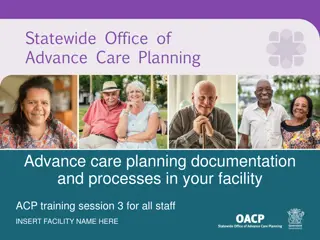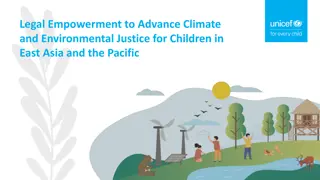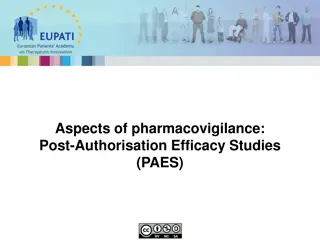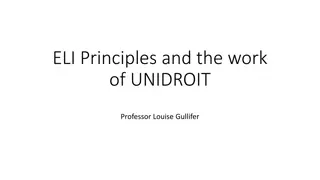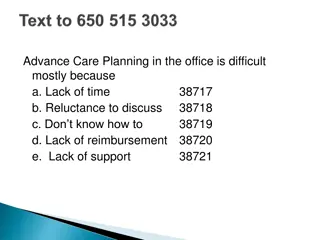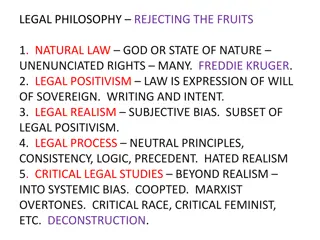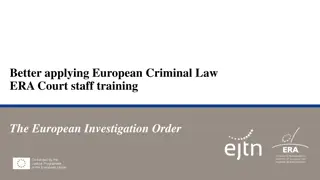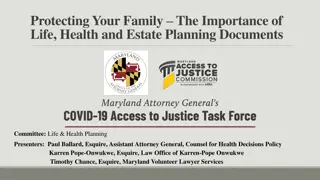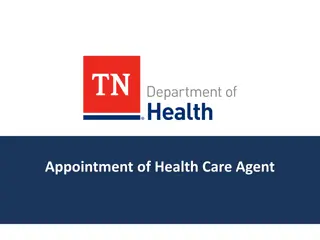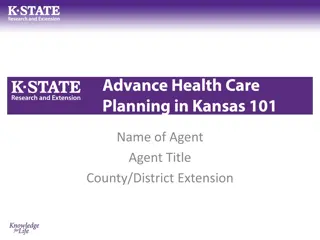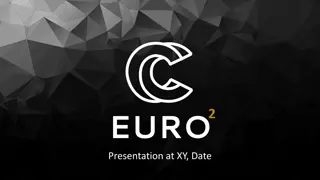European Institute of Legal Studies - ELI Project on Advance Choices
Explore the European Institute of Legal Studies and the ELI Project on Advance Choices for Future Disablement, focusing on advance directives, recommendations, voluntary and non-voluntary measures, and legal protection for incapable adults.
Download Presentation

Please find below an Image/Link to download the presentation.
The content on the website is provided AS IS for your information and personal use only. It may not be sold, licensed, or shared on other websites without obtaining consent from the author.If you encounter any issues during the download, it is possible that the publisher has removed the file from their server.
You are allowed to download the files provided on this website for personal or commercial use, subject to the condition that they are used lawfully. All files are the property of their respective owners.
The content on the website is provided AS IS for your information and personal use only. It may not be sold, licensed, or shared on other websites without obtaining consent from the author.
E N D
Presentation Transcript
Evropsk pr vn institut Europ isches Rechtsinstitut Institut europ en du droit Eiropas Ties bu instit ts Eur pai Jogi Int zet Europees Rechtsinstituut Instituto Europeu de Direito Eur psky pr vny in tit t Euroopan oikeusinstituutti Instituto Europeo de Derecho Europ isk Retsinstitut Euroopa igusinstituut Istituto Europeo di Diritto Europos teis s institutas L-Istitut Ewropew dwar id-Dritt Europejski Instytut Prawa Institutul European de Drept Evropski pravni in titut Europeiska r ttsinstitutet
ELI Project on Advance Choices for Future Disablement
1. WHAT DO WE MEAN BY ADVANCE CHOICES? 2. WHAT CAN PEOPLE USE THEM FOR? 3. WHY THIS PROJECT? 4. WHAT DIFFERENTIATES AN ADVANCE CHOICE FROM AN IMMEDIATE ONE? 5. WHAT WILL THE PROJECT NOT DO? 6. HOW IS ELI DEALING WITH THE PROJECT?
Recommendation (2009)11 1. WHAT DO WE MEAN BY ADVANCE CHOICES ? Advance directives are instructions given or wishes made by a capable adult concerning issues that may arise in the event of his or her incapacity. Principle 2.3 Advance directives may apply to health, welfare and other personal matters, to economic and financial matters, and to the choice of a guardian, should one be appointed. Principle 14
Elements from Rec. (2009)11 and UN Disability Convention Art.12.4 Advance Directives (= Advance Choices) Instructions Given Preferences Recorded Wishes Made
2. WHAT CAN PEOPLE USE THEM FOR?
Voluntary Measures - Unilateral (e.g. Advance Choices) - Bilateral (e.g. Powers of Attorney) Non-Voluntary Measures - Created by court or other authority (e.g. Guardianship) - Automatic (e.g. ex lege representation)
Recommendation (99)4 on principles concerning the legal protection of incapable adults Principle 2.7 Consideration should be given to the need to provide for, and regulate, legal arrangements which a person who is still capable can take to provide for any subsequent incapacity.
Recommendation (2009)11 on principles concerning continuing powers of attorney and advance directives for incapacity Principle 1 1.1 States should promote self-determination for capable adults in the event of their future incapacity, by means of continuing powers of attorney and advance directives. 1.2 In accordance with the principles of self-determination and subsidiarity, states should consider giving those methods priority over other measures of protection.
Recommendation (2014)2 on the promotion of human rights of older persons Principle 14 Member States should provide for legislation which allows older persons to regulate their affairs in the event that they are unable to express their instructions at a later stage.
REPORT: ENABLING CITIZENS TO PLAN FOR INCAPACITY (JUNE 2018) RAPPORT: "PERMETTRE AUX CITOYENS DE S ORGANISER EN CAS D INCAPACIT " https://www.coe.int/en/web/cdcj/activities/powers- attorney-advance-directives-incapacity See Background document at foot of landing page
Provision for advance directives, compared with continuing powers of attorney, is under-developed. There is insufficient clarity as to how to balance expressions of self-determination measures are created, with contradictory expressions when they are subsequently in operation. when voluntary
Promotion of self-determination requires more than availability of voluntary measures in legislation. It requires: availability of fully inclusive forms of document; procedures to establish them; proactive promotion of their use; and removal of barriers to their effective operation, both within states, and in cross-border situations.
4. WHAT DIFFERENTIATES AN ADVANCE CHOICE FROM AN IMMEDIATE ONE?
The Tunnel At the end of the tunnel: Disapplication in particular circumstances, not revocation The beginning of the tunnel: Validity: maximum availability, minimum formalities Top level the most formalities, including in particular robust certification Central registration basic up-to-date terms available in real time
5. WHAT WILL THE PROJECT NOT DO? (a) Not private international law (Hague Conference) (b) Not asking states to change their own substantive law except to facilitate advance choices
Project Participants 6. HOW IS ELI DEALING WITH THE PROJECT? Project Reporters: Christiana Fountoulakis Adrian D Ward 19 Advisors (4 of them Assessors reporting to ELI Council) 18 Country Contributors Some participants have dual roles 32 participants altogether Members Consultative Committee: Currently 11 Members (Europe and beyond) Observer: European Commission
PROJECT TIMESCALE 30 months from 01 January 2023, to include dissemination
Questionnaire (issued to each country contributor) 1. Relevant overview of law and legal system. 2. Consequences of impairment of faculties or capabilities. 3. Extent of particular procedures or formalities for juridical acts. 4. Existing registration systems. 5. Aspects of existing power of attorney regimes. 6&7 Information about any existing provisions for advance choices. 8. Official language(s). 9. Cultural norms and beliefs of population, including of any significant minorities. 10. Any likely exclusions from advance choices on public policy or other grounds. 11. Existing remedies that could be applicable if advance choice not respected. 12. Relevant PIL roles, whether Hague 35 ratified or not. 13. Any existing law reform processes that could be relevant. 14. Particular points that could be relevant to supporting materials. 15. Any other comments?
Research Questions Originally 17 now 26. The completed questionnaires and the proposed answers to the research questions will shape the generation of model laws and supporting materials.
ELI Project on Advance Choices for Future Disablement
Evropsk pr vn institut Europ isches Rechtsinstitut Institut europ en du droit Eiropas Ties bu instit ts Eur pai Jogi Int zet Europees Rechtsinstituut Instituto Europeu de Direito Eur psky pr vny institute Euroopan oikeusinstituutti Instituto Europeo de Derecho Europ isk Retsinstitut Euroopa igusinstituut Istituto Europeo di Diritto Europos teis s institutas L-Istitut Ewropew dwar id-Dritt Europejski Instytut Prawa Institutul European de Drept Evropski pravni in titut Europeiska r ttsinstitutet


